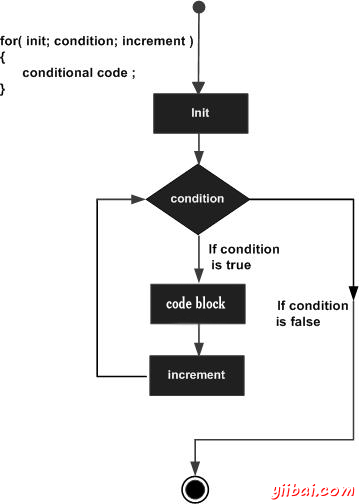Go語言for循環
for循環是一個循環控製結構,可以有效地編寫需要執行的特定次數的循環。
語法
for循環在Go編程語言中的語法是:
for [condition | ( init; condition; increment ) | Range]
{
statement(s);
}
下麵是控製在一個流程的for循環:
-
如果condition是可用的,那麼對於循環隻要條件為真時執行。
-
如果for子句是( init; condition; increment ) 存在則
-
初始化(init)步驟首先被執行,並且隻有一次。這一步可以聲明和初始化任何循環控製變量。不需要把一個聲明在這裡,隻要有一個分號出現。
-
接著,條件(condition)進行了評估計算。如果為true,則執行循環體。如果是假的,循環體不執行,隻是之後的for循環流量控製跳轉到下一條語句。
-
for循環執行主體之後,控製流跳轉回到增量(increment)語句。此語句可以讓你更新任何循環控製變量。這個語句可以留空,隻要一個分號出現條件後。
-
condition現在重新評估計算。如果為true,循環執行的過程中重複(循環體,然後增加步,然後再次條件)。之後如果條件為假,則循環終止。
-
-
如果range可用,然後循環執行的範圍內的每個項目。
流程圖:

例子:
package main
import "fmt"
func main() {
var b int = 15
var a int
numbers := [6]int{1, 2, 3, 5}
/* for loop execution */
for a := 0; a < 10; a++ {
fmt.Printf("value of a: %d\n", a)
}
for a < b {
a++
fmt.Printf("value of a: %d\n", a)
}
for i,x:= range numbers {
fmt.Printf("value of x = %d at %d\n", x,i)
}
}
讓我們編譯和運行上麵的程序,這將產生以下結果:
value of a: 0 value of a: 1 value of a: 2 value of a: 3 value of a: 4 value of a: 5 value of a: 6 value of a: 7 value of a: 8 value of a: 9 value of a: 1 value of a: 2 value of a: 3 value of a: 4 value of a: 5 value of a: 6 value of a: 7 value of a: 8 value of a: 9 value of a: 10 value of a: 11 value of a: 12 value of a: 13 value of a: 14 value of a: 15 value of x = 1 at 0 value of x = 2 at 1 value of x = 3 at 2 value of x = 5 at 3 value of x = 0 at 4 value of x = 0 at 5


